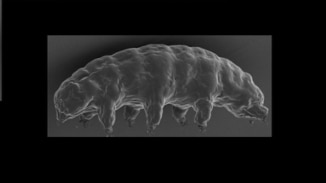
Water Bears' Super Survival Skills Give Up Secrets
揭示水熊虫超强生存技能的奥秘
A protein from microscopic creatures called tardigrades keeps their DNA protected—and could someday shield humans from radiation.
一种来自微生物缓步动物门的蛋白质能够保护其DNA并有望应用于人类防辐射。
撰文/播音:李·比林斯(Lee Billings)
翻译:杨枭
审校:丁可含
Forget cockroaches. Forget Superman. Forget any other tough-as-nails creatures you’ve ever heard of. The most indestructible multicellular organisms on Earth are undoubtedly tardigrades—microscopic eight-legged aquatic invertebrates also known as water bears.
忘记蟑螂,忘记超人,忘记任何你所听说过的如指甲般坚韧的生物。地球上最坚不可摧的多细胞有机体无疑是缓步动物门——微型八足水生无脊椎动物,俗称水熊虫。
These wee beasties can withstand severe dehydration, extreme temperatures and pressures, several days in Earth orbit exposed to the vacuum of space, and whopping doses of radiation that would kill most anything else. And, being Earthlings, there’s no reason to think they’d be vulnerable to kryptonite.
水熊虫可以承受严重的脱水,极端的温度和压力,连续几天生存在处于真空的地球轨道上,还能承受足以杀死其他大多数东西的辐射。我等凡夫俗子必须得承认水熊虫简直就是超人。
Scientists are beginning to understand the genetic basis of tardigrades’ death-defying superpowers. And what they’re learning may have profound implications for human health.
科学家开始了解缓步动物门不畏死亡超能力背后的基因基础。他们所了解到的机理可能对于人类健康有深远的影响。
The genome for a species of tardigrade was first sequenced last year. The analysis suggested that about one-sixth of the DNA was imported from notoriously hard-to-kill bacteria—but that conclusion was soon disputed, with all that bacterial DNA blamed on laboratory contamination.
缓步动物门下一个物种的基因组去年被首次测序。分析结果显示其DNA的六分之一来自于著名的难杀死细菌——但这条结论很快就因为该细菌污染实验室而被推翻。
Now, a new genome has been published of an exceptionally hardy tardigrade species. And it finds that almost all of the DNA is homegrown—and chock-full of sequences responsible for cellular protection and repair. The study is in the journal Nature Communications. [Takuma Hashimoto et al., Extremotolerant tardigrade genome and improved radiotolerance of human cultured cells by tardigrade-unique protein]
现如今,一个特别强壮的缓步动物门物种的基因组已经被公布,从中发现几乎所有的DNA都是它自己特有的,并且充满了负责细胞保护和修复的序列。该项研究发表在期刊《自然 通信》上。
In particular, the researchers discovered the gene for a protein apparently unique to water bears that shields their DNA from radiation damage. Called “DSup” for “damage suppressor,” the protein binds to tardigrade DNA to keep it from snapping apart when bombarded by x-rays and other harsh radiation. The protein’s protective effects against radiation may be a by-product of the tardigrades’ resistance to dehydration, which causes similar damage to cells.
研究者还特别发现一种水熊虫特有蛋白质的基因能够明显保护DNA免受辐射伤害。该蛋白质是一种被称为“DSup”的“损伤抑制剂”,能够与 DNA结合以防止其在被X射线和其它强烈辐射轰击时分离。它的抗辐射保护效果可能是缓步动物耐脱水机制的副产品,因为脱水会对细胞产生相似的损害。
The most remarkable thing about the Dsup protein, though, is that it also seems to work in other organisms—including humans. When the researchers inserted Dsup into cultured human kidney cells, the protein boosted the cells’ tolerance to x-ray damage by about 40 percent.
然而,关于Dsup蛋白最显著的特点在于它似乎也适用于其他生命体——包括人类。当研究人员将Dsup注入培养的人体肾脏细胞时,该蛋白能够使细胞对X射线的耐受性提高约百分之四十。
In theory, Dsup or something much like it could protect workers at nuclear power plants, cancer patients receiving radiation therapy or astronauts on interplanetary voyages. For now, the ethics and practicality of genetic engineering make such applications highly speculative. But, just maybe, if human beings someday stand on the surface of Mars, they could have water bear DNA to thank for helping them survive.
理论上,Dsup或其类似物可以保护核电站的工人,接受放射治疗的癌症病人或进行星际旅行的宇航员。然而目前,基因工程的伦理争议和可行性问题使得这种应用具有风险。但是,也许,如果人类有一天站在火星的表面,他们会感谢水熊虫DNA来帮助他们生存。
(题图来源:http://www.scientificamerican.com)